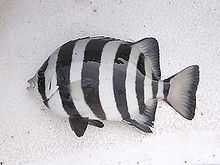Striped beakfish
| Striped beakfish | |
|---|---|
 | |
| Conservation status | |
| Not evaluated (IUCN 3.1) | |
| Scientific classification | |
| Kingdom: | Animalia |
| Phylum: | Chordata |
| Class: | Actinopterygii |
| Order: | Perciformes |
| Family: | Oplegnathidae |
| Genus: | Oplegnathus |
| Species: | O. fasciatus |
| Binomial name | |
| Oplegnathus fasciatus (Temminck & Schlegel, 1844) | |
| Synonyms | |
| |
Oplegnathus fasciatus, the barred knifejaw or striped beakfish, is a species of knifejaw native to the northwestern Pacific Ocean though there area a smattering of records from other localities in the eastern Pacific such as Hawaii and Chile. It is an inhabitant of rocky reefs and occurs at depths of from 1 to 10 metres (3.3 to 32.8 ft). Juvenile members of this species can be found with patches of drifting seaweed. This species can reach a length of 80 centimetres (31 in) TL with the greatest recorded weight for this species of 6.4 kilograms (14 lb). The color pattern consists of light and dark vertical bars from which it derives its name. It has been recorded as feeding on hard-shelled invertebrates such as crustaceans and molluscs. It is a commercially important species and is also farmed. It is also sought after as a game fish.[1] A striped beakfish is the surviving specimen of five striped beakfish that endured more than two years in the partially submerged hull of the Japanese boat Sai-shou-maru.[2][3]
References
- ↑ Froese, Rainer and Pauly, Daniel, eds. (2014). "Oplegnathus fasciatus" in FishBase. February 2014 version.
- ↑ Japanese 'tsunami fish' hitches ride to US
- ↑ The Fish that Travelled 10000 Kilometres